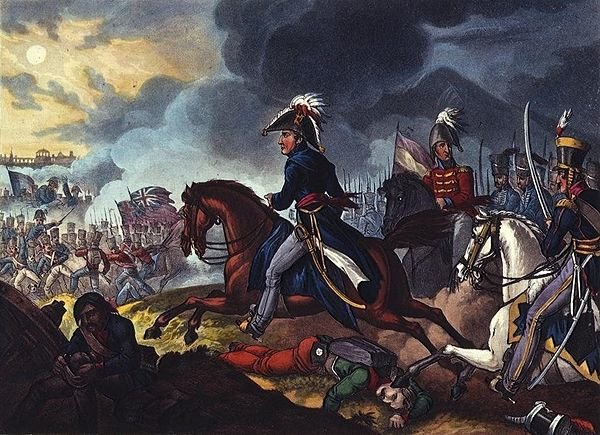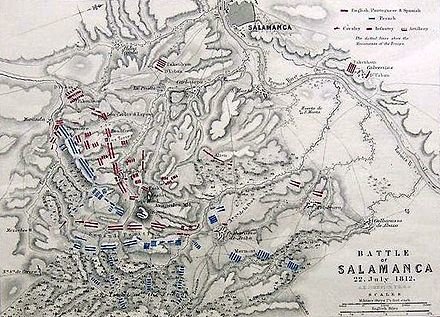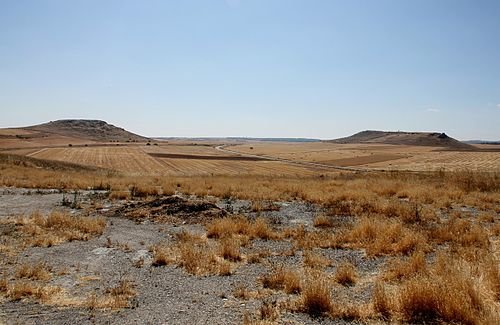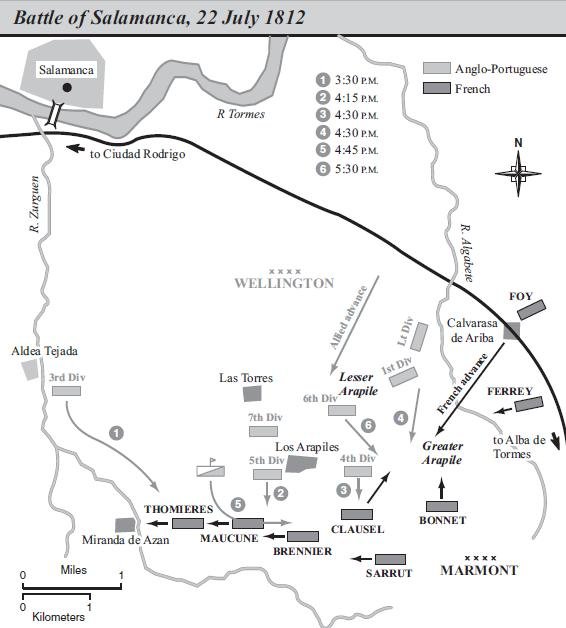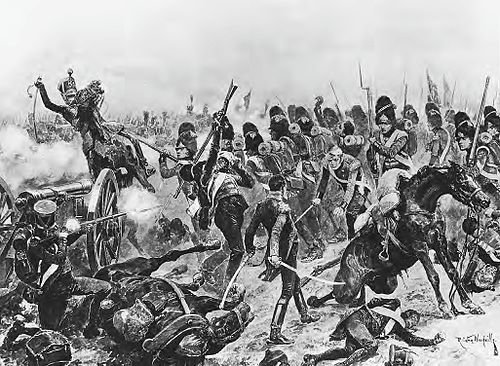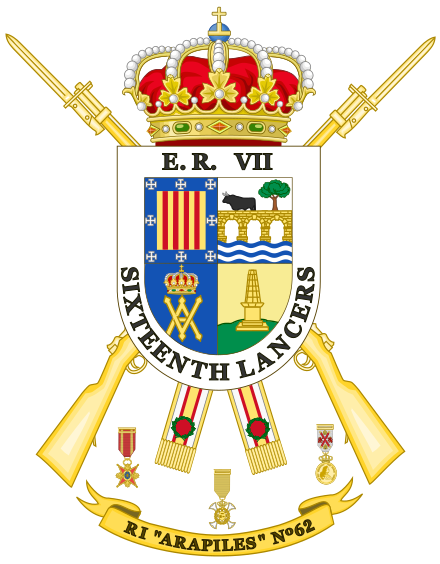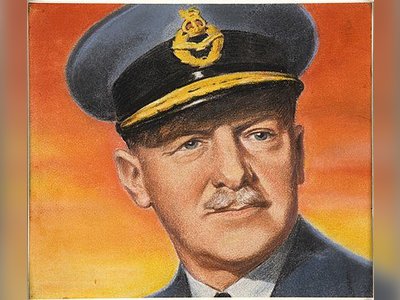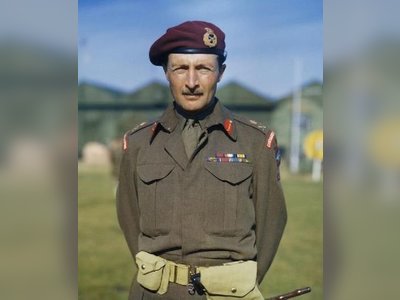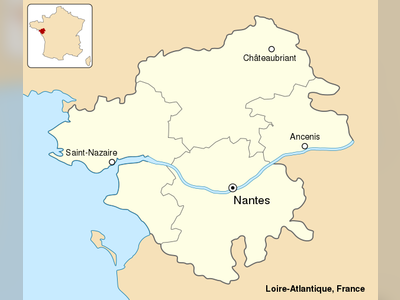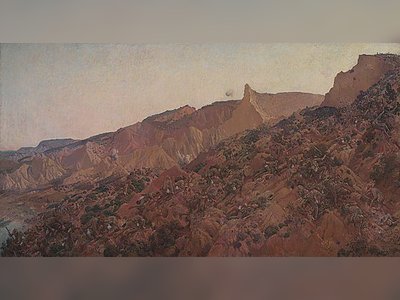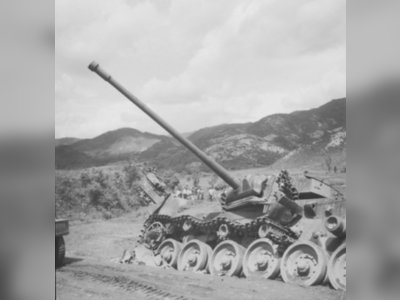British Heritage
Remember, Cherish, Learn.
beta
Battle of Salamanca
Contribution of the Battle of Salamanca to British Heritage.
The Battle of Salamanca, fought on 22 July 1812, holds significant importance in British history as it marked a decisive victory for the Anglo-Portuguese army under the leadership of the renowned Earl of Wellington during the Peninsular War. This pivotal battle showcased the strategic brilliance and tactical prowess of Wellington, solidifying his reputation as an offensive general and elevating him to the level of esteemed military leaders like Marlborough and Frederick the Great.
The battle's impact on British heritage lies not only in its military triumph but also in the broader historical context of the Napoleonic era. The defeat of Marshal Auguste Marmont's formidable French forces at Salamanca bolstered British morale and furthered the cause of British intervention against Napoleon's expansionist ambitions. Moreover, the subsequent liberation of Madrid and the permanent French withdrawal from Andalusia elevated Britain's standing in the international arena and weakened Napoleon's grip on the Iberian Peninsula.
Wellington's strategic genius was evident in the succession of flanking maneuvers executed during the battle, spearheaded by the British heavy cavalry brigade and Pakenham's 3rd Division. These maneuvers led to the rout of the French left wing and paved the way for the Anglo-Portuguese forces' triumph. The battle also showcased the valor of the British and Portuguese soldiers, who demonstrated extraordinary courage and determination in the face of adversity.
The Battle of Salamanca stands as a testament to the indomitable spirit and military might of the British Empire during a period of tumultuous conflict in Europe. Its legacy endures as a defining moment in British military history, and Salamanca Day is commemorated as the regimental day for The Rifles, honoring the soldiers who fought valiantly on that fateful day. Furthermore, the captured Imperial Eagles, displayed in prestigious museums, serve as tangible symbols of the victory and the valor of the British and Portuguese forces.
The success of the Battle of Salamanca had far-reaching consequences, both militarily and politically. Wellington's brilliant tactics and daring offensive maneuvers not only secured a resounding victory but also demonstrated the effectiveness of his strategies in the face of a formidable adversary. The battle showcased the strengths of the Anglo-Portuguese army, boosting the confidence of the troops and their commanders.
As a result of the victory at Salamanca, Wellington's army was able to advance to and liberate Madrid for a period of two months. This strategic triumph dealt a significant blow to the French forces in Spain and severely damaged King Joseph's pro-French government. The French were forced to permanently abandon Andalusia, further weakening their grip on the Iberian Peninsula.
Wellington's reputation as a skilled and daring military leader soared after the Battle of Salamanca. His ability to seize opportunities in the heat of battle and exploit the mistakes of the enemy elevated him to a position of great respect and admiration. His strategic acumen and military successes during the Peninsular War contributed to the ultimate defeat of Napoleon at the Battle of Waterloo in 1815, solidifying his legacy as one of Britain's greatest military commanders.
Beyond the immediate military victories, the Battle of Salamanca played a vital role in shaping the course of the Napoleonic Wars and the fate of Europe. It was a turning point in the Peninsular War, where the tide began to turn against Napoleon's forces. The defeat at Salamanca weakened the French grip on the Iberian Peninsula and contributed to the ultimate downfall of Napoleon's empire.
The Battle of Salamanca, also known as the Battle of Arapiles in French and Spanish, took place on 22 July 1812 during the Peninsular War. The battle was fought near Arapiles, south of Salamanca, Spain. An Anglo-Portuguese army led by the Earl of Wellington engaged the French forces commanded by Marshal Auguste Marmont. The battle involved a series of flanking maneuvers initiated by the British heavy cavalry brigade and Pakenham's 3rd Division, leading to the rout of the French left wing.
The French suffered heavy losses, with about 13,000 dead, wounded, and captured. In contrast, the Allied losses numbered 3,129 British and 2,038 Portuguese dead or wounded. A Spanish division was also present at the battle but did not actively participate.
Following the victory at Salamanca, Wellington's forces advanced to and liberated Madrid for a brief period before retreating to Portugal. The French were forced to permanently abandon Andalusia, and the loss of Madrid severely damaged King Joseph's pro-French government.
The Battle of Salamanca established Wellington as an offensive general and enhanced his reputation as a brilliant military commander. It was a defining moment in British military history and contributed significantly to the ultimate defeat of Napoleon in the Napoleonic Wars. The battle's legacy endures in British heritage, and Salamanca Day is commemorated as the regimental day for The Rifles, honoring the valor and sacrifices of the soldiers who fought in this historic battle. The captured Imperial Eagles serve as enduring symbols of the victory and the indomitable spirit of the Anglo-Portuguese forces.
The battle's impact on British heritage lies not only in its military triumph but also in the broader historical context of the Napoleonic era. The defeat of Marshal Auguste Marmont's formidable French forces at Salamanca bolstered British morale and furthered the cause of British intervention against Napoleon's expansionist ambitions. Moreover, the subsequent liberation of Madrid and the permanent French withdrawal from Andalusia elevated Britain's standing in the international arena and weakened Napoleon's grip on the Iberian Peninsula.
Wellington's strategic genius was evident in the succession of flanking maneuvers executed during the battle, spearheaded by the British heavy cavalry brigade and Pakenham's 3rd Division. These maneuvers led to the rout of the French left wing and paved the way for the Anglo-Portuguese forces' triumph. The battle also showcased the valor of the British and Portuguese soldiers, who demonstrated extraordinary courage and determination in the face of adversity.
The Battle of Salamanca stands as a testament to the indomitable spirit and military might of the British Empire during a period of tumultuous conflict in Europe. Its legacy endures as a defining moment in British military history, and Salamanca Day is commemorated as the regimental day for The Rifles, honoring the soldiers who fought valiantly on that fateful day. Furthermore, the captured Imperial Eagles, displayed in prestigious museums, serve as tangible symbols of the victory and the valor of the British and Portuguese forces.
Success and Legacy
The success of the Battle of Salamanca had far-reaching consequences, both militarily and politically. Wellington's brilliant tactics and daring offensive maneuvers not only secured a resounding victory but also demonstrated the effectiveness of his strategies in the face of a formidable adversary. The battle showcased the strengths of the Anglo-Portuguese army, boosting the confidence of the troops and their commanders.
As a result of the victory at Salamanca, Wellington's army was able to advance to and liberate Madrid for a period of two months. This strategic triumph dealt a significant blow to the French forces in Spain and severely damaged King Joseph's pro-French government. The French were forced to permanently abandon Andalusia, further weakening their grip on the Iberian Peninsula.
Wellington's reputation as a skilled and daring military leader soared after the Battle of Salamanca. His ability to seize opportunities in the heat of battle and exploit the mistakes of the enemy elevated him to a position of great respect and admiration. His strategic acumen and military successes during the Peninsular War contributed to the ultimate defeat of Napoleon at the Battle of Waterloo in 1815, solidifying his legacy as one of Britain's greatest military commanders.
Beyond the immediate military victories, the Battle of Salamanca played a vital role in shaping the course of the Napoleonic Wars and the fate of Europe. It was a turning point in the Peninsular War, where the tide began to turn against Napoleon's forces. The defeat at Salamanca weakened the French grip on the Iberian Peninsula and contributed to the ultimate downfall of Napoleon's empire.
General Information
The Battle of Salamanca, also known as the Battle of Arapiles in French and Spanish, took place on 22 July 1812 during the Peninsular War. The battle was fought near Arapiles, south of Salamanca, Spain. An Anglo-Portuguese army led by the Earl of Wellington engaged the French forces commanded by Marshal Auguste Marmont. The battle involved a series of flanking maneuvers initiated by the British heavy cavalry brigade and Pakenham's 3rd Division, leading to the rout of the French left wing.
The French suffered heavy losses, with about 13,000 dead, wounded, and captured. In contrast, the Allied losses numbered 3,129 British and 2,038 Portuguese dead or wounded. A Spanish division was also present at the battle but did not actively participate.
Following the victory at Salamanca, Wellington's forces advanced to and liberated Madrid for a brief period before retreating to Portugal. The French were forced to permanently abandon Andalusia, and the loss of Madrid severely damaged King Joseph's pro-French government.
The Battle of Salamanca established Wellington as an offensive general and enhanced his reputation as a brilliant military commander. It was a defining moment in British military history and contributed significantly to the ultimate defeat of Napoleon in the Napoleonic Wars. The battle's legacy endures in British heritage, and Salamanca Day is commemorated as the regimental day for The Rifles, honoring the valor and sacrifices of the soldiers who fought in this historic battle. The captured Imperial Eagles serve as enduring symbols of the victory and the indomitable spirit of the Anglo-Portuguese forces.
- Battle of Salamancaen.wikipedia.org
